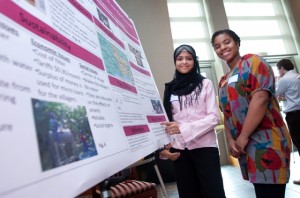
Thafhim "Muna" Siddiqua '13, left, and Taneesha Tate Robinson '13 presented their project at Lafayette's Community Based Learning and Research expo.
When Thafhim “Muna” Siddiqua ’13 (Silver Spring, Md.) and Taneesha Tate-Robinson ’13 (Bowie, Md.) learned about the devastating effects of arsenic poisoning due to contaminated drinking water in Bangladesh, they decided to put together a service project to help.
In preparation for their Save Me from Arsenic project, the students teamed up with John Greenleaf, visiting assistant professor of civil engineering, and Joe Goodwill ’04, an engineer with Black & Veatch, to assess arsenic treatment units in West Bengal, India.
Greeleaf, who has conducted arsenic research for more than 10 years, and Goodwill, a team leader for the nonprofit Water for People, traveled to the country this spring. Tate-Robinson, an international affairs major, and Siddiqua, a civil engineering major, observed from campus via webcam to see if the Indian treatment units would be feasible in Bangladesh. They also assisted Goodwill and Greenleaf with documenting the trip and presented their findings at a brown bag lecture on campus.
“The students got to interact with professionals and in particular an alumnus, which adds important perspective in terms of career and professional growth and the opportunities that exist for individuals in this field,” says Greenleaf. “This combines learning with service as well as professional interaction quite outside the typical college experience.”
For Siddiqua, who hopes to work for the Environmental Protection Agency after graduation, gaining knowledge through the West Bengal experience and planning the Bangladesh project are special opportunities.
“I feel very lucky to be involved in this kind of research,” she says. “It’s one of those opportunities that can help make a difference in a country. Clean drinking water is a fundamental right for everyone, and we want to give that right to the people of Bangladesh. I’m also grateful to be able to work with Professor Greenleaf, who has done a lot of work in this field of study.”
While Siddiqua will tackle the arsenic issue from an engineering perspective, Tate-Robinson will look at it from a broader perspective. She also will ensure that the educational part of their project will be easily understood by people who don’t have an engineering background.
“I’m an international affairs major because I want to travel and learn about different cultures,” says Tate-Robinson, who plans to join the Peace Corps after graduation. “I’m very excited to have the opportunity to further our research on arsenic. The setup in India seemed very efficient, and it will be interesting to see if such a system could be sustained in Bangladesh.”
The students are applying for a $10,000 Davis Projects for Peace grant to help fund the project.
